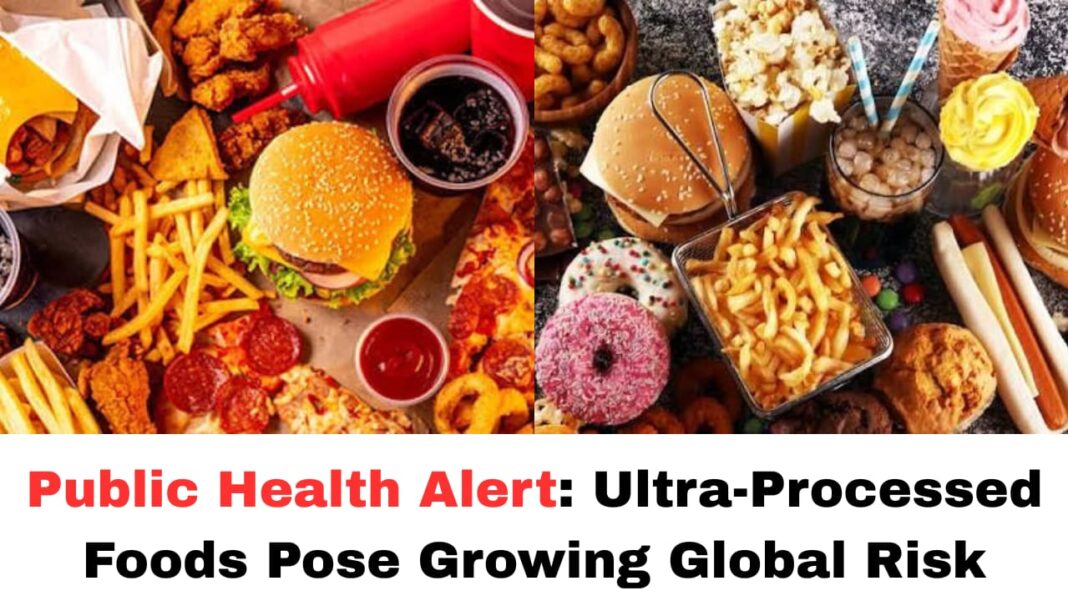Digital News Guru Health Desk:
Ultra-Processed Foods Linked to Global Health Crisis
A landmark series of research papers has sounded a stark alarm: ultra-processed foods (UPFs) are emerging as a major global threat to public health. According to 43 experts working on a series published in The Lancet, these industrially manufactured foods are now deeply embedded in diets worldwide, and mounting evidence links them to chronic diseases, premature death, and even damage across multiple organ systems.
What Are Ultra-Processed Foods?
UPFs are industrial food products made with multiple processing steps and ingredients, often with little to no whole food content. They typically contain additives like flavorings, colorants, emulsifiers, and preservatives. Common examples include sugary soft drinks, instant noodles, packaged snacks, processed meats, and ready-to-eat meals.

Because of their high sugar, salt, and unhealthy fat content — and the fact that they’re engineered to be hyper-palatable — these foods are deeply profitable for manufacturers and highly attractive to consumers.
Health Risks: What Research Shows
- Chronic Diseases
A systematic review of 104 long-term studies, as part of the Lancet series, found that 92 of them reported a statistically significant link between high UPF consumption and at least one chronic illness. The conditions most commonly associated include:
- Type 2 diabetes
- Obesity
- Cardiovascular diseases
- Depression
- Multiple Organ Damage
According to a comprehensive review by the same Lancet authors, UPF consumption isn’t just linked to a handful of diseases — it may harm every major organ system in the body. The review highlights mechanisms like poor nutritional quality, overeating, and exposure to additives and potentially harmful substances. - Premature Mortality
A large international study published in the American Journal of Preventive Medicine found that for every 10% increase in UPF in someone’s diet, there was a 3% higher risk of dying before age 75. This is deeply worrying because in many high-income countries, UPFs make up over half of daily calorie intake. - Cardiometabolic & Brain Health Risks
Other reports point to links between UPFs and heart disease, hypertension, and stroke. Some studies also suggest connections to cognitive decline, with food processing itself (not just nutrient content) playing a role in long-term brain health. (Emerging research reports higher stroke risk and cognitive impairment in individuals with very high UPF diets.) - Mental Health
There is also mounting evidence that UPF consumption is linked with mental health disorders, such as depression and anxiety. These associations amplify concerns about public health beyond just metabolic disease.
The Call for Action: What Experts Are Demanding
The Lancet paper authors are not just sounding the alarm — they are urging urgent government intervention. Their recommendations include:
- Regulation of Production & Marketing: Policymakers should consider policies to restrict how UPFs are produced, packaged, and marketed — particularly to children.
- Warning Labels: Front-of-pack warning labels on UPF products should highlight their level of processing, not just fat, sugar, or salt content.

- Taxation & Subsidies: Taxes on ultra-processed products, combined with subsidies for fresh or minimally processed foods, could shift consumption patterns.
- Advertising Limits: Restricting UPF advertising, especially in media consumed by children, and banning UPF in public institutions (schools, hospitals) are among the proposals.
Experts emphasize that these are not just consumer issues — they reflect a systemic economic and political problem, where multinational food companies have major influence and profit motives that conflict with public health.
Global and National Relevance
- In India, the report is especially urgent. The Lancet series warns that rising UPF sales — particularly in cities — are contributing to the country’s surge in obesity and diabetes. According to the authors, policy action in India is especially critical because traditional diets are being replaced by convenience, industrially produced options.
- On the global stage, this is not just about nutritional advice. UPFs are increasingly being framed as a public policy issue, analogous to how tobacco was addressed decades ago.
- Reflecting this urgency, the World Health Organization (WHO) has issued a call for experts to develop formal global guidelines on UPF consumption. The WHO Guideline Development Group will evaluate evidence and propose recommendations to member states — a stand that many public health professionals are welcoming.
Barriers & Industry Pushback
Unsurprisingly, the food industry is not backing down easily. The Lancet authors highlight the role of powerful corporations that use sophisticated marketing, research funding, and lobbying to protect business interests. Critics also argue that the concept of “ultra-processed” is too broad or ill-defined — that not all UPFs carry the same risk — and that current nutrition policies (e.g., targeting sugar, fat, and salt) may suffice.
Still, the authors counter that waiting for perfect data shouldn’t stall action: the evidence today already justifies policy-level interventions.
What Can Individuals Do?
In light of these warnings, people can protect themselves by:
- Reducing reliance on highly processed convenience foods;
- Prioritizing whole or minimally processed foods (vegetables, grains, lean proteins);
- Reading ingredient labels carefully — especially watching out for additives, emulsifiers, and flavoring agents;
- Supporting or advocating for public policies that limit harmful food marketing and encourage healthier alternatives.

Why This Is a Bigger Public Health Moment
This isn’t just about individual dietary choices anymore. The scale and complexity of UPF consumption reflect a deep structural shift in the global food system — one that’s being driven by profit rather than public health. The rising burden of non-communicable diseases (obesity, diabetes, cancer) demands a response beyond education: a regulatory, economic, and ethical response.
If governments adopt the recommendations emerging from the Lancet series, we could see a shift toward safer food environments — similar to past public health victories that curbed smoking or reduced trans fats. With the WHO already stepping in to set guidelines, the foundations for major policy change are being laid.
You May Also Read: Congress Forms Five-Member Panel for DMK Seat-Sharing Talks Ahead of 2026 Tamil Nadu Polls








